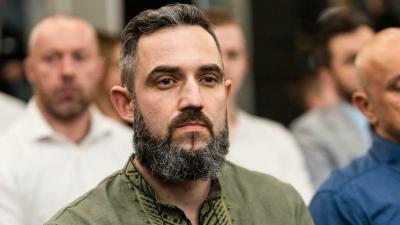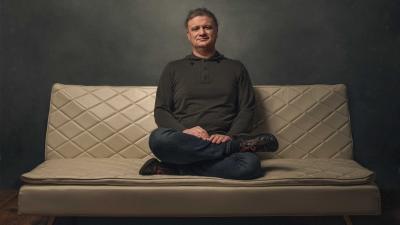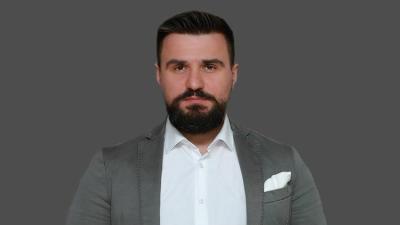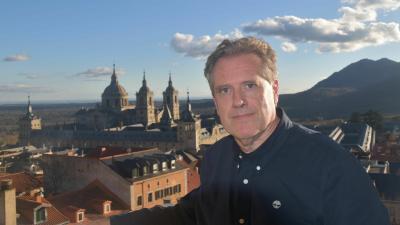Andrzej Podgurski is a Polish journalist and volunteer. A war correspondent since the beginning of the full-scale Russian invasion, he is the spokesman for the Polish Legion, an umbrella organization of humanitarian and military volunteers in Ukraine.
Álvaro Peñas: When was the Polish Legion founded and what is it?
Andrzej Podgurski: The Polish Legion was founded in March 2022 as a unit of volunteers engaged in humanitarian aid and evacuation of civilians. Then we received requests from many Poles who wanted to join the Ukrainian army or the International Legion to fight against Russian aggression. It was chaotic, so we decided to help all volunteers who wanted to enlist. The first obstacle was the Polish law, which prohibits enlisting in a military formation in another country, but President Duda overruled this prohibition with regard to Ukraine, and we hope that this will be maintained in the future. Once that was resolved, we contacted various companies to get the best possible equipment for the volunteers, from the basics to drones, all in cooperation with the Ukrainian units they will be serving with.
Why did you join the Polish Legion?
I am half Polish and half Ukrainian, so it was natural for me, because I could not remain unmoved by what was happening. I started helping in 2013 by organizing actions in support of the Maidan revolution in Warsaw, and in December I moved to Kyiv to take part in the protests. I witnessed street fighting and sniper fire that killed many protesters. Then I was in Crimea with other Polish journalists and saw the first evidence of the presence of Russian soldiers (the green little men) and how they took control of the peninsula. Throughout 2014, I was in Mariupol, Marinka, Pisky and all along the front. With the start of the full-scale invasion, I took a course to become a certified war correspondent with the Polish Ministry of Defense and was in places like Bakhmut and Zaporiyia. That’s when the Polish Legion contacted me and offered me to be their spokesman. That is what I do now, as well as running a foundation to help our volunteers.
And what motivates the rest of the volunteers?
The motivation of our members is very diverse, but most of them understand that it is necessary to stop Russia in Ukraine, because if we don’t do it, Poland or any other country will come later. It is necessary to stop Russia and to make them understand that further aggression will not be tolerated. We have already seen what happened in Chechnya, Georgia and twice in Ukraine.
You also support the work of paramedics. The best known is Damian Duda, but there are many others, such as Witold Dobrowolski, whom I interviewed in 2022.
Yes, the work of paramedics is very important and they have saved many lives. Duda and his team were recently decorated by the Polish president and are considered heroes in Ukraine. I know both of them personally.
Do you defend a political ideology?
No, we promote fraternity between Poles and Ukrainians, although we support the idea of the Intermarium. A geopolitical concept created after World War I by Polish Marshal Józef Piłsudski to unite several countries located between the Baltic, Black and Adriatic Seas.
Russia commits war crimes against its own people and bombs civilian targets on an almost daily basis.
Yes, I have been to many places full of residential buildings that have been bombed. I have seen the destroyed houses and the civilians, including children, who are suffering and have been killed or injured by the impact of missiles or drones. My son was born in Lviv, we wanted to take him to Warsaw to be born in a safe place, but the trip was complicated. On the day he was born, the Russians launched a massive attack on Lviv. Although our hospital was three kilometers from the bombing site, the shock wave opened all the windows.
Do you think that Russia can break the Ukrainians’ will to fight with this shelling?
No, the Ukrainians will not give up and will continue to fight. You only have to know their history to know that, for example, the resistance against the Soviets after World War II lasted until the 1960s. Recently someone from the CIA said that the Ukrainians were generally underestimated and that they would continue to fight even if they stopped receiving US aid.
What do you think about Trump and his policy towards Ukraine?
In my opinion, before Trump, the dominant position in the Western world was that what Russia was doing was not right because they were shelling civilian targets and the Ukrainians were suffering. But after Trump came in, the narrative changed and they want to present Putin and Russia as a normal president and a normal country. They are not, and this discourse is very dangerous. The killing of civilians and the destruction of a country and its borders cannot be tolerated.
You are half Polish and half Ukrainian. Relations between the two peoples have been damaged by the so-called "Volyn Massacre" in 1943, the massacre of Polish civilians by Ukrainian nationalists. What is needed to heal this wound?
This issue touches me personally because my great-grandfather was killed by the Ukrainians, so I know the situation very well. My point of view is very different from those who say that all Ukrainians are guilty and therefore they should not be helped now. Those who are responsible for this crime must be clearly pointed out, as well as those who were not. The whole nation cannot be blamed for the actions of a few, and it is necessary to remember this so that it does not happen again. I believe that we must find a way to properly remember the victims, and Poland and Ukraine must work together to heal the wounds, avoiding propaganda and using historical documents, especially at a time when both countries are under Russian threat.
Read also
Country Report: Spain & Portugal, February 2023
Spain’s parliament continues to opt for the most radical progressive agenda, and the month of February saw a modification of the abortion law, an approval of the trans law and the first step towards the animal rights law, or animal dignity law, which must be still ratified in the Senate.
Álvaro Peñas
Interview with Miguel Ángel Quintana Paz: "More and more people who are dissatisfied with the world realise that Catholicism has the tools to face today’s challenges".
Miguel Ángel Quintana Paz. Academic Director of the Higher Institute of Sociology, Economy and Politics (ISSEP) in Madrid. Professor at the postgraduate program “Expertise in Social Communications” at the Pontifical University of Salamanca.
Álvaro Peñas
Oleksandr Shulga: “The West must understand that, unlike Putin, the Russians do have limits”
Our war is defensive and aims to drive out the invader and show the Russian regime and society that this war is pointless and will achieve nothing.
Álvaro Peñas
Darío Madrid: “It is not necessary to defend a pink legend of the Inquisition, but simply to put it in context”
Álvaro Peñas: Why a book about the Spanish Inquisition?














Comments (0)